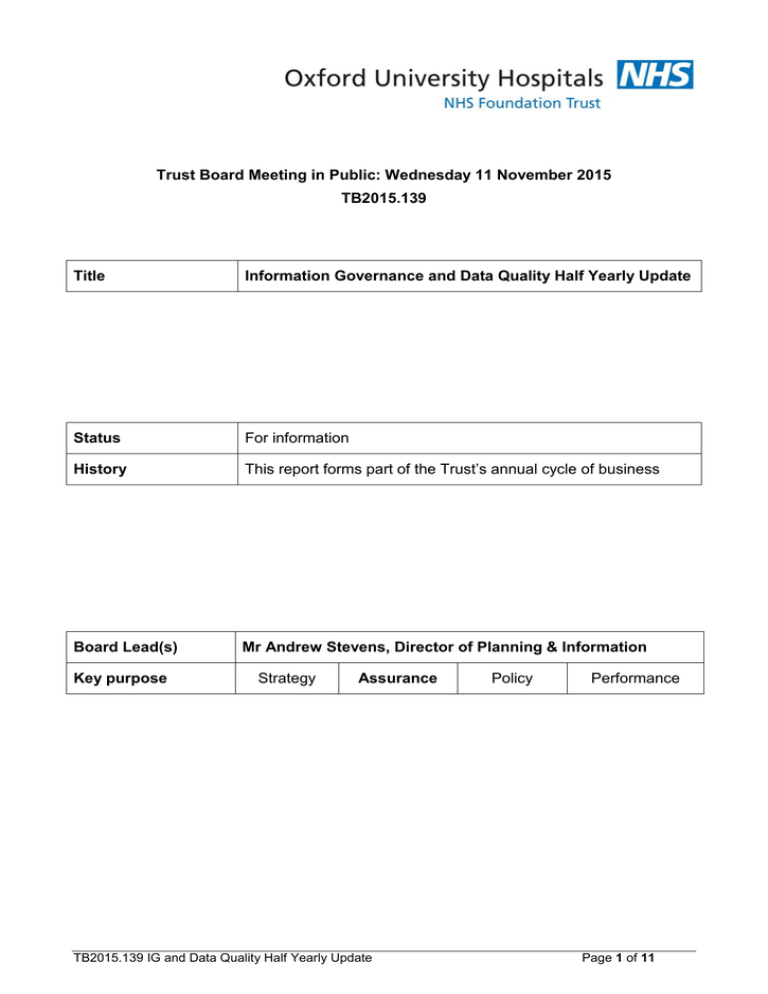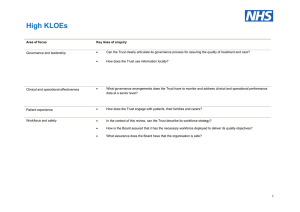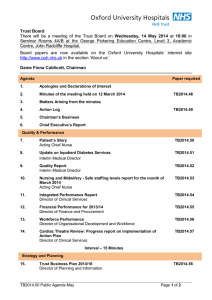Trust Board Meeting in Public: Wednesday 11 November 2015 TB2015.139 Title
advertisement

Trust Board Meeting in Public: Wednesday 11 November 2015 TB2015.139 Title Information Governance and Data Quality Half Yearly Update Status For information History This report forms part of the Trust’s annual cycle of business Board Lead(s) Mr Andrew Stevens, Director of Planning & Information Key purpose Strategy Assurance TB2015.139 IG and Data Quality Half Yearly Update Policy Performance Page 1 of 11 Oxford University Hospitals TB2015.139 Executive Summary 1. This report aims to provide assurance on the key issues and risks relating to information governance and data quality. 2. The Trust’s performance measured in the Information Governance Toolkit return at the end of March 2015 was significantly improved from the previous year, increasing from 86% to 91% and maintaining the top level rating of satisfactory. The new 2015/16 version resets all scores downwards but the baseline submission at the end of July still achieved a top level ‘Satisfactory’ score. 3. The staffing of the team managing Information Governance in support of the Senior Information Risk Officer and Caldicott Guardian will return to full strength in November. 4. The number of Serious Incidents Requiring Investigation (SIRIs) related to information governance has been at zero for the last six months . 5. Progress on implementing the recommendations of Information: To share or not to share (the Caldicott2 Review) and the Government’s Response is being regularly monitored by the Information Governance and Data Quality Group. 6. Requests for information under the Freedom of Information Act have continued at an increased level over the last six months and the review of the Publication Scheme continues to look at placing more information in the public domain. The impact of possible legislative changes is being monitored. 7. Recommendation The Trust Board is asked to note and consider this report. TB2015.139 IG and Data Quality Half Yearly Update Page 2 of 11 Oxford University Hospitals TB2015.139 Information Governance and Data Quality Half Yearly Update 1. Purpose 1.1 The information governance and data quality updates are provided on a sixmonthly basis. The purpose is to provide assurance on risks and issues relating to information governance and data quality. 2. Background 2.1 The Information Governance Group and the Data Quality Group merged in May 2013 to form the Information Governance & Data Quality Group (IGDQG). The joint work programme covers the actions required to improve compliance with the annual information governance assessment (the Information Governance Toolkit), the recommendations arising from internal audit reports, and any other issues that the group considers necessary. The annual work programme is reviewed at the six-weekly meetings of the IGDQG. 3. Key issues 3.1. Information Governance Self-Assessment. 3.1.1 Version 13 of the IG Toolkit assessment for 2015-16 has been analysed and changes to the requirements have been discussed at the Information Governance and Data Quality Group. These changes have resulted in the need to upload new evidence and review existing evidence to ensure that the Trust continues to meet the highest levels of achievement and this will be done through the year. 3.1.2 The Trust’s overall attainment level in the Information Governance Toolkit continues to improve. 2011/12 – 71%, Not Satisfactory 2012/13 - 81%, Not Satisfactory 2013/14 – 86%, Satisfactory 2014/15 – 91%, Satisfactory 2015/16 – Interim score 74%, Satisfactory (baseline score at end July) 3.1.3 It should be noted that the current score is an interim score as new evidence, new requirements and changes to the existing requirements mean the score from the end of 2014/15 financial year is reset. In light of these changes, we have ensured that we have met level 2 (of 3) on all 45 of the requirements. We currently have achieved level 3 in 11 of the requirements. Appendix 1 details the achieved level for each group of requirements. 3.1.4 The Information Governance Toolkit submission is subject to review by the Trust’s internal auditors. There is a scheduled audit for November 2015 which will review areas of the Toolkit in relation to our compliance with the Caldicott 2 report. 3.1.5 The IGDQG will continue to monitor progress against the work programme at its regular meetings. TB2015.139 IG and Data Quality Half Yearly Update Page 3 of 11 Oxford University Hospitals TB2015.139 3.2. Supporting the Senior Information Risk Officer (SIRO) 3.2.1 The SIRO (Mr Andrew Stevens) and the Caldicott Guardian (Dr Chris Bunch) continue to be supported by the Information Governance Manager, Information Governance Officer and Freedom of Information (FOI) Officer. Additional IG support is provided by the Director of IM&T and Head of Medical Records and their teams. All Divisions and relevant corporate Directorates are represented at the IGDQG. 3.2.2 Each of the Divisions has their own Information Governance and Data Quality structures supported by the central team. 3.2.3 The annual IG work programme aims to ensure the SIRO is fully informed on all information risks and breaches in confidentiality. 3.3. Information Governance Risks 3.3.1 The top risks related to information governance are registered on Health Assure and are reviewed by the IQDQG. 3.3.2 Following a report and investigation into confidential waste being left unsecured, a new risk has been added to that risk register that reflects the current need to ensure that our third party waste contractors meet our legal obligations around ensuring the correct storage and destruction of confidential waste. This contract will shortly be put up for retender and this provides an opportunity for the trust to review its confidential waste needs. 3.4. Information Governance Training 3.4.1 Information Governance (IG) training is mandatory for all staff. The Information Governance toolkit requires that all staff undergo training and is an indicator on the Foundation Trust self-certification returns. 3.4.2 Training compliance figures remain steady and comparable with last year’s data. 3.4.3 Training is delivered primarily via the Trust’s e-Learning Management System (eLMS) and face to face training for new staff in their Trust Induction; training materials have been approved by NHS Connecting for Health and include an online competency assessment. Staff have three attempts to pass before being asked to complete either the paperbased workbook or assessment or attend a face to face training session. 3.4.4 In addition to this, the IG Team have held a number of drop-in sessions in order: • To improve the Trust’s overall IG training target • To provide more one-to-one training to improve staff knowledge A more targeted approach to these drop-in sessions is being developed to ensure greater compliance. 3.4.5 Work is being done to review our training provision with Learning and Development to increase the interactivity and usability of the training TB2015.139 IG and Data Quality Half Yearly Update Page 4 of 11 Oxford University Hospitals TB2015.139 material to deliver best practice and an improved user experience for the majority of staff. 3.5. Work Plan 3.5.1 The key area of work focuses on reviewing the Information Asset Register, improving its utility to the Trust. Information Asset Owners review data flows of the assets and ensuring proper awareness of all transfers of personal data. 3.5.2 Review of the training currently being provided is continuing with a target of making it more focussed and relevant, especially focusing on individuals who work closely with Personal Confidential Data. 3.5.3 Corporate records are to be audited in at least four corporate areas which includes a review of all types of records including emails. 3.5.4 The Trust’s progress on implementing the recommendations of the Caldicott report (Information: to share or not to share) and the government’s response to that report are also part of the work plan and feature in evidence required in a number of the Toolkit requirements. 3.6. Information Incidents 3.6.1 IGDQG receives monthly incident reports relating to breaches in confidentiality and information security. Serious Incidents Requiring Investigation (SIRIs) – There have been no reportable incidents this year. Complaints – There have been two complaints from patients and staff, which involved an element of information governance. Information Commissioner’s Office concerns – The Information Commissioner may be asked by members of the public, to investigate issues relating to an organisation’s information rights practice. This year there have been five such enquiries, three answered to the ICO’s satisfaction and two currently being investigated. 3.6.2 Work is being done to review our analysis of incidents, provide better support to divisions and ensure that learning in relation to incidents is better disseminated throughout the Trust. 3.7. Freedom of Information 3.7.1 From April to August 2015/16 the Trust received 203 Freedom of Information requests. In this period 69% of these requests were answered within the 20 day statutory limit. This is comparable to response rates for 2014/15 and remain 10% higher than 2013/14. The vast majority of requests continue to come from journalists and private companies with significant additional requests coming from researchers both inside and outside the NHS. In addition, requests for a review of responses remain extremely low with only two across the whole year (0.3% of requests) and these were anticipated due to the nature of the requests. TB2015.139 IG and Data Quality Half Yearly Update Page 5 of 11 Oxford University Hospitals 3.7.2 TB2015.139 There have been no major legislative changes to the Freedom of Information function although the government has launched a public consultation on the future of Freedom of Information. 3.8 Data Quality Assurance Framework 3.8.1 At the heart of the Trust’s data quality approach is the data quality assurance framework. Under this framework the data underpinning all of the key performance indicators included in the Integrated Performance Framework are given a two component rating by the Information Governance and Data Quality Group. The first component of the rating is a ranking on a scale of 1-5 to reflect the level of assurance that is available around the data quality. The second component comprises a traffic light rating to indicate the level of data quality that the assurance mechanisms have found. 3.8.2 The ratings for all indicators are reviewed informally by the indicator owners on a quarterly basis. Any proposed changes have to be approved by the IGDQG. In addition, the ratings of all indicators are formally considered on an annual rolling basis by the IGDQG. At these formal reviews, the indicator owners are required to present the evidence supporting the proposed rating for the data underpinning each indicator to the IGDQG. The IGDQG then considers the evidence and rates it against the framework. 3.8.3 During 2015/16, progress continues in ensuring that the evidence supporting each rating is held on the Health Assure assurance tool with indicator owners responsible for uploading new or revised evidence 3.8.4 The Data Quality Assurance Framework is underpinned by a programme of data quality audits undertaken by services themselves as well as by the Trust’s own internal auditors and other external bodies. The results of these audits and the associated action plans are monitored at each meeting of the IGDQG. 3.8.5 The trust Internal Data Quality Audit report achieved a result of significant assurance. All recommendations from the auditors and responses from within the trust are monitored and tracked through the IGDQG to ensure compliance and completion. 3.8.6 The Trust also benchmarks its data quality performance using the Secondary User Service Data Quality Dashboard. The Trust performs strongly against both national benchmarks and local peer organisations, achieving a data validity score at the end of the quarter 1 of 2015/16 of 99.1% against a national average of 96.1%. 3.9 False Or Misleading Information (FOMI) 3.9.1 In early February, the Department of Health announced the results of a consultation held in mid-2014 on proposed new legislation. The new legislation would make it a criminal offence for an NHS body to intentionally or negligently provide information that they must report as part of their statutory duties. 3.9.2 The offence forms part of the Government’s overall drive to improve openness and transparency in the provision of health services, by TB2015.139 IG and Data Quality Half Yearly Update Page 6 of 11 Oxford University Hospitals TB2015.139 making clear that a sanction exists for failing to provide or publish accurate or honest information about the performance of services. The FOMI offence should act as a driver to improve the integrity of both data requests made to NHS providers and also the data received. This should, in turn, improve the overall quality of data. 3.9.3 The datasets included in this proposed legislation have been provided, reviewed and compared to those in the Integrated Performance Report (IPF) to identify any data sets that are not covered by the. The Data Quality Assurance Framework (DQAF). The DQAF that is primarily focused on the Integrated Performance Framework (IPF) sets out an established methodology to ensure the accuracy of the data underpinning the indicators in the IPF. 3.9.4 All but two of the datasets that fall under this new legislation are already captured by the Trust within the IPF, however, it adds an additional emphasis to ensuring that data collection, validation and reporting is given the resources and tools required to provide due diligence in light of this new legislation. 3.9.5 The Trust is looking to apply the Data Quality Assurance Framework to the datasets not already covered. 3.9.6 The Trust has sought guidance from the National Diabetes Audit which remains the only dataset on which the trust requires assurance to meet the required standards. We are continuing to work with the National Diabetes Audit to identify the necessary assurances that our data meets the required standards outlined by the new legislation. 3.10 Cyber Security 3.10.1 Cyber security represents an increasing risk to all organisations. In recognition of this the Audit Committee received a presentation on cyber security issues from its internal auditors at its meeting in February 2014. Following this, the Trust commissioned an audit of its cyber security maturity from its internal auditors. This audit and the associated recommendations were reported to the Audit Committee at its meeting in September 2014. 3.10.1 The audit report and its recommendations have formed the basis of a cyber-security action plan. 3.10.2 An update on cyber security issues was considered by the Audit Committee at its meeting on 27 April 2015. The report: • Provided an update on progress against the actions within the cyber security action plan. • Identified key cyber security issues and the Trust’s response. • Set out future priorities/next steps. 3.11 Internal Audit of Information Governance 3.11.1 The Trust internal auditors KPMG will be conducting a review during November 2015 of the Information Governance Toolkit with an emphasis on compliance with the requirements that relate to the Caldicott 2 report – TB2015.139 IG and Data Quality Half Yearly Update Page 7 of 11 Oxford University Hospitals TB2015.139 “Information: To Share or not to Share” and the Government’s response to the report. 3.11.2 The report and recommendations from this audit will inform the IG Workplan and actions to be taken before the March 2016 Toolkit return is completed. 4. Conclusion 4.1. The Information Governance and Data Quality Group continue to monitor the Trust’s activities that manage confidentiality and data quality and to review significant issues as these arise. This report summarises the key issues from the last six months. 5. Recommendation 5.1 The Trust Board is asked to note and consider this report. Mr Andrew Stevens Director of Planning and Information October 2015 Report prepared by Francine Tanner- Data Quality Programme Manager Tom Mansfield - Information Governance Officer Mik Horswell – Interim Information Governance Manager TB2015.139 IG and Data Quality Half Yearly Update Page 8 of 11 Oxford University Hospitals TB2015.139 Appendix 1 Version 13 (2015-2016) Assessment (baseline July) Information Governance Management Assessment Stage Overall Score Self-assessed Grade Version 13 (2015-2016) Baseline 66% Satisfactory Latest 66% Satisfactory Assessment Stage Overall Score Self-assessed Grade Version 13 (2015-2016) Baseline 77% Satisfactory Latest 77% Satisfactory Assessment Stage Overall Score Self-assessed Grade Version 13 (2015-2016) Baseline 73% Satisfactory Latest 73% Satisfactory Confidentiality and Data Protection Assurance Information Security Assurance Clinical Information Assurance TB2015.139 IG and Data Quality Half Yearly Update Page 9 of 11 Assessment Stage Overall Score Self-assessed Grade Version 13 (2015-2016) Baseline 80% Satisfactory Latest 80% Satisfactory Assessment Stage Overall Score Self-assessed Grade Version 13 (2015-2016) Baseline 75% Satisfactory Latest 79% Satisfactory Assessment Stage Overall Score Self-assessed Grade Version 13 (2015-2016) Baseline 66% Satisfactory Latest 66% Satisfactory Assessment Stage Overall Score Self-assessed Grade Version 13 (2015-2016) Baseline 74% Satisfactory Latest 74% Satisfactory Secondary Use Assurance Corporate Information Assurance Overall Grade Key TB2015.139 IG and Data Quality Half Yearly Update Page 10 of 11 Not Satisfactory Satisfactory with Improvement Plan Satisfactory TB2015.139 IG and Data Quality Half Yearly Update Not evidenced Attainment Level 2 or above on all requirements Not evidenced Attainment Level 2 or above on all requirements but improvement actions provided Evidenced Attainment Level 2 or above on all requirements Page 11 of 11


